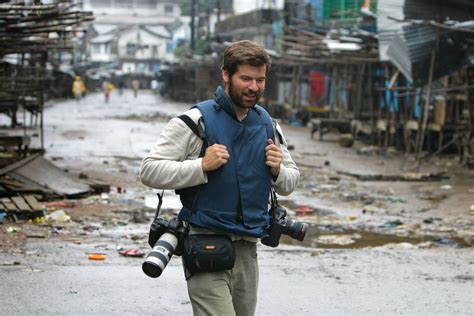A Quote by Chris Hondros
One of the things I believe in is a sense of human nature.
Quote Topics
Related Quotes
The Idols of Tribe have their foundation in human nature itself, and in the tribe or race of men. For it is a false assertion that the sense of man is the measure of things. On the contrary, all perceptions as well of the sense as of the mind are according to the measure of the individual and not according to the measure of the universe. And the human understanding is like a false mirror, which, receiving rays irregularly, distorts and discolors the nature of things by mingling its own nature with it.
By experience; by a sense of human frailty; by a perception of "the soul of goodness in things evil;" by a cheerful trust in human nature; by a strong sense of God's love; by long and disciplined realization of the atoning love of Christ; only thus can we get a free, manly, large, princely spirit of forgiveness.
The sciences that purport to treat of human things -- the new scientific storyings of the social, the political, the racial or ethnic, and the psychic, nature of human beings -- treat not of human things but mere things, things that make up the physical, or circumstantial, content of human life but are not of the stuff of humanity, have not the human essence in them.
I believe that the basic nature of human beings is gentle and compassionate. It is therefore in our own interest to encourage that nature, to make it live within us, to leave room for it to develop. If on the contrary we use violence, it is as if we voluntarily obstruct the positive side of human nature and prevent its evolution.
Idealists are people who believe in the potential of human nature for transformation. . . . The most essential attribute of human nature is its mutability and freedom from instinct . . . it is always within our power to change our nature. So it is actually the idealists who are on the mark and the realists who are off base.
Really to believe in human nature while striving to know the thousand forces that warp it from its ideal development - to call for and expect much from men and women, and not to be disappointed and embittered if they fall short - to try to do good with people rather than to them - this is my religion on its human side. And if God exists, I think that he must be in the warm sun, in the kindly actions of the people we know and read of, in the beautiful things of art and nature, and in the closeness of friendships.
I have a hunch that our obsession with photography arises from an unspoken pessimism; it is our nature to believe the good things will not last. . . But photos provide a false sense of security> like our flawed memory, they are guaranteed to fade. . . . We take photographs in order to remember, but it is in the nature of a photograph to forget (pg 157)


































